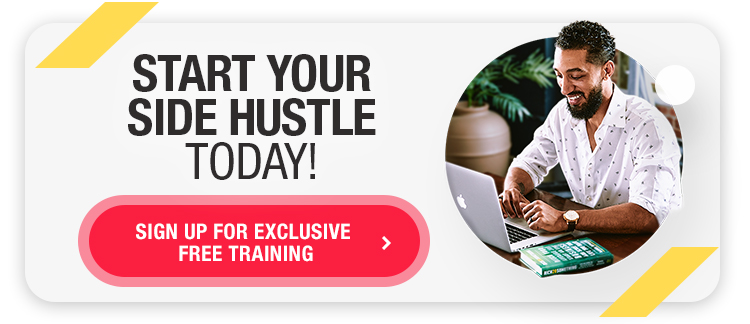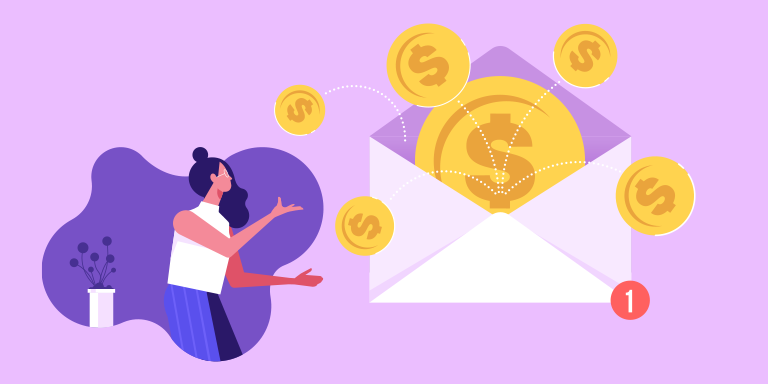Starting an online business can be a bit overwhelming. While you don’t have the initial real estate and staffing overhead to worry about, you still have a lot to do.
First (and most importantly), you need a solid online business idea. Once you’ve got that down, you’ll be ready to hash out the plan to bring it to fruition.
Don’t get lost in the minutiae just yet. Before you start building a checklist, let’s take care of the most essential step: finding you the perfect online business idea.
There’s no one-size-fits-all magical business idea out there. Some ideas are gold mines for specific entrepreneurs, while others are dumpster fodder—you’ll have to do a bit of digging to find what ideas are your trash and which are your treasures.
Remember: you’re not trying to find a soulmate. You’re researching and choosing an online business idea.
That means you won’t necessarily find the one. You might be equipped with the right skills and entrepreneur know-how to make a dozen unique online business ideas succeed. Don’t get caught up so thoroughly that paralysis by analysis claims you. Find the right idea, and make it happen.
We’re here to help. There’s a scary-big digital world bursting with online business ideas for beginners and experts alike—the endless possibilities are a blessing and a curse. We’re here to harness and focus your potential.
Below, we’ve identified 12 unique online business ideas that are perfect for absolute beginners. We’ll walk you through the ideas, let you taste the opportunities, and then show you how to bring your business to life.
But first, let’s kick things off with a bit of mental validation. Here’s why starting an online business is a brilliant idea.
Why an Online Business Idea Is Gold
This is a unique time in the history of the world. Thanks to the evolution of the internet and its widespread accessibility, you can start an online business from the comfort of your home. And not just any run-of-the-mill company—we’re talking 6-figure income.
It’s not all about luck and hustle, either. Online business ideas aren’t just for those who can’t cut it in the “real world”—digital businesses have a few advantages that make them easy to start up and scale. Let’s look at a few.
Flexibility and Freedom
With an online business, you’re never tied to a desk or a typical 9-to-5. In fact, you don’t need a desk. You don’t even need a home. You could run your business anywhere at any time—all you need is a laptop and internet connection.
Travel during your free time and live the life you’ve always wanted. Manage your agenda and work the schedule that suits you best.
An online business gives you the freedom and flexibility to live how you want.
Low Startup Costs
Online businesses are relatively cheap to start. Most of the time, all you need is a basic website. If you’re selling physical products through an ecommerce or drop-shipping model, you might need a bit of initial inventory, but that’s it.
You won’t need to cover expensive rent or pay employees an hourly wage from the get-go. Later, you might expand and hire staff or contract workers to help, but you can wait until money is rolling in to scale your business.
High ROI
With low overhead, you’ll see more revenue from every sale—and your earning potential is practically unlimited. That’s because your earnings aren’t usually tied to your working hours. They’re tied to your productivity, lead generation tactics, and advertising.
Your business will have higher ROI potential because it won’t be tied to the same constraints as a physical store. An online business can be marketed to anyone at any time through an array of digital mediums and platforms.
Once you build a reliable online system, it can run itself while you sleep. Literally.
Speed and Agility
If you’re really determined, you could have your online business up and running today. Yes, today.
We’d recommend putting a bit more thought and research into it first, but, theoretically, you could find an idea, spin up a site, and start selling in less than 24 hours.
That’s a feat only online businesses can accomplish. Plus, it’s easy to pivot and adjust on the fly if need be. For example, if you find your business idea isn’t panning out, you could end it and start over without missing a beat or putting yourself in a financial mess.
12 Unique Online Business Ideas for Beginners
Below, we’ve compiled a shortlist of our favorite online business ideas. No idea is necessarily better than any other—you’ll have to read through them and see which resonates best with you.
Some entrepreneurs will be drawn to freelancing models with reliable, consistent income, while others will gravitate toward high-reward options like ecommerce. Creative minds might lean towards branding and podcasting, while hustlers may be attracted to blogging or virtual assisting.
Remember: there’s no Cinderella silver slipper here.
You might find 1, 2, 3, or all 12 of these ideas resonate with you—and that’s OK. Make a list of pros and cons if you need to and narrow down your top choices.
The beauty of having an online business is that you aren’t necessarily limited to one. You might invest all your time and energy into one idea now, and you could start another in a year or so.
1. Consulting
Have you worked in a particular field before starting up your own business online? Do you have expertise in a specific profession? Do you hold any technical skills that make you marketable?
If you answered ‘yes’ to any of those questions, then a consulting business might be the right option for you. Whether it’s accounting, taxation, IT, education, or even engineering, clients are willing to pay for your knowledge and expertise.
First, you’ll need to find a target audience and what you’re going to offer. While you might be a jack-of-all-trades, clients generally don’t want a well-rounded guru—they want a very specific expert for a very specific task.
For example, a company that needs help with their Facebook advertisements doesn’t want a marketing professional or a social media specialist—they want a Facebook ads genius. Look for a need, and offer the solution.
While you’re at it, identify your target market. If you’re going to offer Instagram marketing help, don’t make your market anyone who needs help with Instagram—that’s a lot of people. Niche down further to something like independently-owned restaurants or startup SaaS companies.
2. Freelancing
Freelancing is one of the most attractive options if you’re looking to start an online business. According to research conducted by Upwork, freelancing comprised nearly $1 trillion of the US GDP in 2019—and this trend is expected to continue over the years as the promise of flexibility and independence attracts eager minds.
As a freelancer, you’re in control of everything. You get to choose which industries you want to work in, which clients you’ll take on, what kind of work you provide, and how many hours you work. It’s all up to you.
Here are a few different ways you can freelance:
- Write articles or marketing copy (Writer)
- Design logos or illustrations (Graphic Designer)
- Build websites and landing pages (Website Builder)
- Develop applications (Developer)
- Take and edit pictures (Photographer)
- Optimize sites for SEO (SEO Expert)
- Balance books and organize finances (Bookkeeper)
This is just a taste of what you can do with freelancing. You can turn just about any full-time job or task into a freelancing career. Let your imagination run wild and turn your skills into income.
The best part about freelancing is that it’s a safe online business idea to start as a side hustle. You can start a freelance business without quitting your 9-to-5, giving you adequate time to test your idea, score some clients, and earn some income before making any big life decisions.
Freelancing shares a lot in common with consulting. The major difference between the 2 is in the deliverable.
Consultants typically offer advice, while freelancers provide goods. For example, a consultant might provide expertise on marketing strategies while a freelancer writes the advertising copy.
3. Blogging
Blogging in 2025 isn’t just about writing your thoughts and waiting for traffic. Today’s successful bloggers are niche media entrepreneurs, building audiences through search, social, and email, then monetizing through affiliate links, products, and newsletters.
There is real potential for those who blog it out for the long haul. It’ll take time and effort, but bloggers can earn big bucks and passive income if they know what they’re doing.
That’s the caveat. Blogging takes a lot of expertise. You’ll need to know how to write, build a website, optimize for search engines, market your blog, and monetize your traffic. It’s a lot, but if you can do it well, you have unlimited earning potential.
While you could quit your job and start blogging full-time today, there are safer ways to explore this online business idea. Instead, consider starting a consulting or freelance business on the side while you dip your toes into blogging.
This approach will give you time to develop your blog and start building an audience while you have other income to support you. Once you have an audience and consistent traffic, you can decide how you’re going to monetize the eyeballs:
- Advertisements: Run ads across your blog to other websites and products.
- Affiliate marketing: Link to products you endorse and earn a percentage of every sale that clicks through your links.
- Product: Once you have an audience, you can create a unique product or even sell something as simple as T-shirts.
- Services: When you’re seen as an expert in your field, people will be willing to pay for your skills. You could offer courses, coaching, consulting, or even freelance services.
- Membership plan: Offering high-value content? Make your audience pay to read it.
- Sponsored posts: Allow other brands or other websites to pay to post on your blog.
4. Ecommerce
Ecommerce is a tried-and-true online business idea. Put simply, it’s selling stuff on the internet.
Although competition is fierce in this arena, the market is enormous, and there are plenty of opportunities to make a full-time income.
Building an ecommerce business has a lot of parallels to establishing one in real life. It requires a solid business plan, marketing and operational strategies, and the finances to get it all started.
Here are a few best practices to get you on the right path:
- Do your research. Identify an actionable niche, look into your competition, find partnership opportunities, and build a model that works best for your offering. Don’t start based on a hunch.
- Identify your brand and buyer personas. Who are you selling to? What image do you want your business to convey? Build your website with these questions in mind and formulate a foolproof marketing and brand strategy.
- Do all the groundwork. This involves registering your business, getting the relevant licenses and permits, and designing a logo.
- Attract customers to your website. Use SEO tactics, build traffic, and grow your customers. This is an ongoing process that’ll ultimately determine whether your business succeeds or fails.
Not ready to commit to product sourcing? Start with a print-on-demand service like Printful or TeeSpring. You upload the design, and they handle printing and shipping. You only pay when you make a sale.
5. Course Creating
Dewey Finn (Jack Black) might have said, “Those who can’t do, teach; those who can’t teach, teach gym,” but that’s just not the case. If you’ve gained expertise in a field, there’s likely a market for those who’d pay for that knowledge.
Welcome to course creation.
If you’re good at something (really good) you can probably teach it. And that means you can probably sell it. Welcome to the world of online courses.
These days, people are paying to learn everything from basic Excel to backyard composting to how to build AI-powered newsletters. If you’ve got a skill, there’s probably someone who wants it—and if you package it right, they’ll pay.
But don’t start filming 47 videos tomorrow. Step one: validate. Build a one-page site, put a “Preorder Now” button on it, and send it to your network or social feed. If no one clicks? You’re not ready. If they do, congrats—you’ve got something worth building.
Start simple. Map your lessons. Keep them practical. Host your course on platforms like Teachable or Podia. Focus on outcomes. What will someone be able to do after finishing your course?
You can create an online course on just about anything. You could teach Python, math, copywriting, web design, or even a foreign language. If you have a skill, you can turn it into an online course.
Here’s how to make it happen:
- Identify the Opportunity: Find a problem, and design a course with the solution. If you find people are struggling to navigate Google Analytics or grow grass in Colorado, create a course that offers answers.
- Validate Your Idea: Create a landing page or website, drive traffic, and see if people click the “Buy Now” button.
- Outline Your Course: Decide what your course will cover and how you’re going to cover it.
- Build Your Course: Start writing or filming your course to solve your target market’s issues.Find Your Beta Group: Test your course on a group of beta testers to gather initial feedback and perfect your design.
- Launch Your Online Course: Take your course global with the right launch strategy.
- Build Your Community: Foster a community of engagement and participation within your course.
Check out our step-by-step guide to creating an awesome online course to learn more.
6. Podcasting
People thought they were too late to the podcast game 5 years ago. Well, it turns out people keep making (and succeeding with) new podcasts even now in 2021. We’re living in the gold rush period of podcasting, and it’s lasting a decade long.
Our own podcast has been a game-changer for Foundr and the brand. We wouldn’t be the same without it!
While some influencers do podcasting for fun, it’s also a reliable business model. There are plenty of ways to make money through podcasting, but the most direct way is through advertising and sponsorships. Business Insiders forecasts ad spending on podcasts will reach $1.13 billion by the end of 2021—that’s a lot of advertising budget on the table!
Getting started is simple. All you need is a microphone and someone to talk to. Heck, you can even start with your phone for a mic and yourself for the interviewee—nice and easy.
Here’s how to get started with podcasting:
- Identify Your Niche: What will the theme, topic, or purpose of your podcast be? Who will be interested in your podcast? With more than 55% of consumers listening to podcasts, you can find a market in just about any category.
- Choose Your Type: Will you go for the classic interview style or the storytelling model? Do you want to do a news-like podcast or a discussion-based podcast? Whatever you choose, it’s best to keep it consistent so your audience knows what to expect.
- Find Someone to Interview: Ever wonder how people get the likes of Seth Godin or Daymond John on their podcasts? Well, it takes a little know-how, but it’s definitely in your realm of possibilities.
- Record Your Episodes: Set up the mic, get your discussion material ready, press “record,” and let the magic happen.
- Launch Your Podcast: You’ll need to decide where you will host all your podcast content (our guide can help). Then, launch your podcast to the world.
- Promote to Your Audience: Use marketing tactics to promote your podcast and drive traffic to your episodes.
Build the audience first. Once you have consistent traffic to your podcasts, then you can start monetizing. This could be in the form of sponsorships, advertisements, affiliate marketing, or selling your own products.
7. Virtual Assisting
Practically every business needs administrative help, and that’s what you can offer as a virtual assistant (VA). Here are the different services you could provide as a VA:
- Scheduling appointments
- Making phone calls
- Planning travel arrangements
- Submitting invoices
- Handling client relations
- Responding via email or social media
- Managing basic finances
Basically, you can offer anything that would make a business owner or executive’s life easier.
Trust us—we recommend most entrepreneurs find a virtual assistant as soon as possible. As a VA, you’re a hot commodity (especially if you do it super well).
We use a VA, Pat Flynn had one, and John Lee Dumas had about 12. Clearly, there’s a market for virtual assistants.
8. Social Media Managing
There are millions of businesses worldwide, and each one needs a social media presence. Social media profiles are a must-have in 2021—more important than even a business phone number.
However, while everyone from your 8-year-old niece to your 90-something-year-old grandmother knows how to use social media, managing a business on social media is a whole new ball game.
Social media manager jobs have been on the list of top careers with real growth opportunities for a while now, and the trend looks set to continue. If you have skills in creating original content and building social followings, then there’s a good chance many businesses will be willing to pay for your talents.
Not a social media guru but want to become one? You’ve come to the right place. Check out our free Instagram growth course to learn how we went from 0 to 500K followers in just 12 months (and how you can, too).
You can use that knowledge to build your own social media business, or you can sell your skills to companies looking to replicate the strategy.
9. Branding
Designing a logo is hard. Writing a catchy tagline is a struggle. Tying it all together under one cohesive brand with a unified vision and story—now, that’s just downright challenging. Not everyone can do it, and that’s why brand experts are a godsend for businesses of all shapes and sizes.
As a branding expert, you can either offer consulting or freelancing services. You can advise businesses to help them find and create the right brand elements, or you can roll up your sleeves and get your hands dirty with graphic design and copywriting.
You’ll need to start small and work your way up. The biggest selling piece of any brand expert is the brands you’ve previously worked with. That means you’ll likely need to work with a few startups and small businesses at first, and then you can piggyback off those names to move up the chain.
10. Online Fitness Training
After 2020, online fitness and wellness are commonplace. Once upon a time, it was just Peleton on the scene, but now everyone from big-name fitness brands to local gyms is taking fitness online. And you can, too.
Again, you have options. If you’re an experienced yoga instructor, calisthenics expert, or weight-lifting coach, you can offer your coaching services to a gym or brand with an online training presence. Or you can flex your entrepreneur muscles (see what we did there?) and start your own online fitness brand.
The freelance coaching option is pretty straightforward, but you’ll need to get a bit more clever with a brand-new business. First, you’ll need to create the content. You might do this through an ongoing repository, or you might only provide live-streamed training sessions—that’s up to you.
Regardless of your choice, you’ll need to start outlining the trainings and get ready to bring them to life.
Next, you’ll need to bring in the customers. You’ll likely need to rely on local advertising or digital marketing techniques to bring in paid customers.
Before launching anything, validate your online fitness program. There’s a lot of competition out there, so you need to make sure your online business idea will fly before you spread your wings and jump.
11. Domain Flipping
Love building websites? You can make a career out of it.
Use a domain marketplace like Flippa to find websites for sale. Buy them, polish them up, and sell them for a profit. It’s that simple.
Domain flipping isn’t just a leftover idea from the dot-com bubble. It’s alive and well, and continues to generate revenue.
Here’s how it works: you buy domain names that you think could be valuable in the future (think: “aigrowthtools.com” or “greenenergyplanner.com”), and you either sit on them until someone wants to buy… or improve them and sell for a profit.
Some individuals go big, buying entire websites on marketplaces like Flippa, adding a bit of SEO juice, applying a better design, and flipping them for 2–3 times what they paid. Others take the long game, collecting premium domain names and holding out for serious buyers.
You don’t need a huge budget to get started. Many good domains are $10–$50 per year. You just need a good eye, a sense of what’s trending, and a bit of patience.
You’ll need to spend some time getting to know the industry and what people are looking for. For example, you’ll want to identify high-value domain names and sites that are already generating healthy amounts of organic traffic. These will be major selling points when you relist the website.
Your job will be to look past the ugly user interfaces out there and see the gold mines hidden beneath. Most buyers will ignore a site that looks old and outdated, but that doesn’t mean it lacks potential.
Some buyers are focused solely on the domain name, willing to demolish the existing site and build it from the ground up with the perfect URL. You could make money from simply buying domains, sitting on them, and reselling them later.
For example, if you notice a new trend, search for domains that new businesses might be interested in buying. Get those domains at a discount (we’re talking $10–15 a year) now, and you could end up selling it for $30 million later.
OK, that example is a stretch, but hopefully, you see what we mean.
12. Subscription Box Curating
You can build a subscription box business for just about any niche—Henrik Werdelin even built a 9-figure subscription box business for dogs.
Creating a subscription box service is a lot like starting an ecommerce business. Often, you don’t need any original products. You’re just curating a box of hand-picked items that your customers will appreciate.
Some boxes solve a problem, like those who want vegan-friendly meals or shiny-new razors shipped to their doors. Others satisfy a craving or curiosity, like those who want interesting outdoor equipment or foreign chocolates.
Identify your niche, come up with a subscription box, validate your idea, and make it happen.
How to Make Your Idea Come to Life
Regardless of which online business idea you go with, you’ll need to follow a few steps to bring it to life. Below, we’ll walk you through the basics:
- Research the Niches: With any business idea, you should first find a problem, identify the market, then provide a solution. Do your research to make sure there’s demand.
- Choose Your Online Business: Once you have a problem and a niche, identify which business type will address the issue. Consider what kind of business you want. Do you want to offer consulting services or build an ecommerce solution? There’s no right answer—you’ll just need to decide what you want to do and what best solves your niche’s needs.
- Crunch the Numbers: Get out your calculator. You likely won’t have too many expenses (that’s the beauty of an online business), but you’ll need to determine how many customers and sales you’ll need to make to stay afloat and support yourself.
- Validate Your Online Business Idea: Validate before you launch. Test your idea with a small group and a limited budget to see if it has potential. This step will help prevent you from wasting time and resources on bad ideas.
- BYOB (Build Your Own Brand): You’ll need a name, logo, voice, and vision. Don’t rush through this part. Take your time to craft a brand that you’re proud of and that you can scale.
- Claim Your Digital Real Estate: Online, you’ll need a domain name, website, social profiles, and email address (at a minimum). Claim these things as soon as possible to prevent losing them.
- Make Your First Sale: Bring in the traffic and make the sale. Don’t make this too complex. Think of your website as a digital storefront. You need to bring customers in, and then you need to convince them to buy something before they leave. That’s it.
- Scale Your Online Business: Making your first sale is great, but now you need to scale your business. Scale could mean more customers or higher prices—or both. As the business owner, you get to decide.
Make Your Online Business Idea a Reality
Ideas are great, but you want more than just an idea—you want a business! That’s the next step.
Join our free masterclass training to learn how to start an online side hustle in 30 days or less. We’ll give you a proven roadmap for how to turn your talents into income without quitting your 9-to-5 (yet). Sign up, and you’ll receive our free ebook with more than 100 side hustle ideas (if these 12 weren’t enough for you).
Don’t let your idea live and die as an idea. Bring it to life. Join the training now to make your online business idea a reality.


















